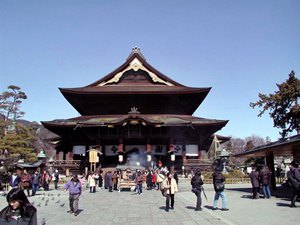
The isolated location of the Japanese nation is reflected in their National character and traditional way of life. The longevity of the Japanese, low level of violence in the country, homogeneity of the ethnic composition of the population – these are what immediately captures your attention and create a very special impression. At present, Japan is the only empire in the world that till date piously honors its traditions and at the same time achieves a tremendous success in the development of technologies and its overall economic standing. The reasons for such an amazing combination of the legacy of the past and the achievements of the future become more apparent if one knows more about the uniqueness of the Japanese National Character.
This is a magnificent country, a travel to which will leave many unforgettable memories. While describing numerous excursions and entertainment, …
Read further
The Japanese are distinguished by their conservative nature. That is, they do not seek to borrow the habits and traditions of other nations. Rather, they remain faithful to their historical customs and norms of behavior. National identity holds a special place in their lives, deserving a corresponding attitude, namely, respectful obeisance, exchange of courtesies when meeting and saying goodbye. In relation to a foreigner, it is enough to nod, salute, or not take notice of him at all. In this country where the succession of generations plays an important role, elders are revered and the heritages of the past are regarded with great respect. The Japanese are however willing to explore new ideas and subsequently incorporate them into their way of life if it is good. Despite adopting useful innovations from other cultures, Japan never loses its national identity.
Japanese culture is focused on collectivism. The Japanese feel a close affection towards family members, co-workers and other social groups which they are members of. Hierarchy dominates in groups. Everyone keeps his place and observes subordination in relation to the higher ones. The Japanese have a submissive and humble attitude toward the elders and more authoritative individuals. Collectivism and the desire to maximally improve the conditions for the existence of the team led to the formulation of strict etiquette and a code of courtesy. Copyright www.orangesmile.com
Japan is a state on islands surrounded with water. This fact defines the peculiar nature of the Japanese culinary system. Most of her dishes are …
Read further
In the Japanese culture, three styles of communication are observed; one for addressing younger persons, another to equals or strangers, and the third, to elders. Therefore, the Japanese do not allow informal communication with bosses even during off-hours. They never confront each other in public, showing a storm of emotions. Requests are denied without saying the word “no” allegorically. Direct refusal is considered a violation of the rules of etiquette. The Japanese are a very polite people. Every one of them from birth is taught respect for others. They respect personal boundaries and are therefore not inclined to be interested in someone else’s private life. They neither discuss their personal affairs with others, nor offer advice if not requested.
![]()
The Japanese possess a love and diligence for their work, a sense of duty, responsibility and sacrifice. This nation is like no other; inherent in their ability to behave with dignity and possessing a great self esteem and discipline in all aspects of their lives. Lateness or disregard for punctuality is not tolerated. In this regard, the Japanese are considered workaholics. To fulfill their official duties, the Japanese are relentless with themselves. Working until late at night is considered normal to them. The Country’s lack of mineral resources has also influenced the mentality of her people, thereby resulting in the thrift and diligent management of her economy. The Japanese have absolutely no craving for a luxurious life, this they consider wastefulness. Natural observation and attention to detail allows them to easily find opportunities for savings their hard earned resources. This helps them to find simple but ingenious solutions for optimizing life.
Japan is an amazing country of contrasts, in which traditional Eastern culture is closely intertwined with some elements of Western influences. …
Read further
An integral part of the Japanese mentality is the desire to see the beauty. Admiration of the beauty of nature and the benefits of human creativity are the basis of the mentality and culture of the Japanese. The Japanese always go into a state of euphoria while protractedly enjoying the flowering sakura trees, the sunset over Fujiyama, and the impeccability of calligraphy drawings. It is their love for aesthetics that gave rise to such trends in art as Ikebana, Bonsai, and the tea ceremony. The latter is especially appreciated by the Japanese. Tea ceremony is divided into stages. The main thing in the ritual is a master of tea, pouring tea over the cups. The foundations of this tradition are laid down by the laws of Zen Buddhism. Residents of the Land of the Rising Sun fondly love tea ceremonies and receive true pleasure, observing all their canons.
 The isolated location of the Japanese nation is reflected in their National character and traditional way of life. The longevity of the Japanese, low level of violence in the country, homogeneity of the ethnic composition of the population – these are what immediately captures your attention and create a very special impression. At present, Japan is the only empire in the world that till date piously honors its traditions and at the same time achieves a tremendous success in the development of technologies and its overall economic standing. The reasons for such an amazing combination of the legacy of the past and the achievements of the future become more apparent if one knows more about the uniqueness of the Japanese National Character.
The isolated location of the Japanese nation is reflected in their National character and traditional way of life. The longevity of the Japanese, low level of violence in the country, homogeneity of the ethnic composition of the population – these are what immediately captures your attention and create a very special impression. At present, Japan is the only empire in the world that till date piously honors its traditions and at the same time achieves a tremendous success in the development of technologies and its overall economic standing. The reasons for such an amazing combination of the legacy of the past and the achievements of the future become more apparent if one knows more about the uniqueness of the Japanese National Character.
 The Japanese possess a love and diligence for their work, a sense of duty, responsibility and sacrifice. This nation is like no other; inherent in their ability to behave with dignity and possessing a great self esteem and discipline in all aspects of their lives. Lateness or disregard for punctuality is not tolerated. In this regard, the Japanese are considered workaholics. To fulfill their official duties, the Japanese are relentless with themselves. Working until late at night is considered normal to them. The Country’s lack of mineral resources has also influenced the mentality of her people, thereby resulting in the thrift and diligent management of her economy. The Japanese have absolutely no craving for a luxurious life, this they consider wastefulness. Natural observation and attention to detail allows them to easily find opportunities for savings their hard earned resources. This helps them to find simple but ingenious solutions for optimizing life.
The Japanese possess a love and diligence for their work, a sense of duty, responsibility and sacrifice. This nation is like no other; inherent in their ability to behave with dignity and possessing a great self esteem and discipline in all aspects of their lives. Lateness or disregard for punctuality is not tolerated. In this regard, the Japanese are considered workaholics. To fulfill their official duties, the Japanese are relentless with themselves. Working until late at night is considered normal to them. The Country’s lack of mineral resources has also influenced the mentality of her people, thereby resulting in the thrift and diligent management of her economy. The Japanese have absolutely no craving for a luxurious life, this they consider wastefulness. Natural observation and attention to detail allows them to easily find opportunities for savings their hard earned resources. This helps them to find simple but ingenious solutions for optimizing life.


